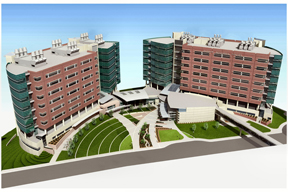 The University of Nebraska Medical Center will break ground on a $74 million research tower on Tuesday, Aug. 8, the second such tower to be built at the Omaha campus this decade.
The University of Nebraska Medical Center will break ground on a $74 million research tower on Tuesday, Aug. 8, the second such tower to be built at the Omaha campus this decade.
The ceremonial groundbreaking will honor the principal donor to the two towers, legendary Omaha businessman Chuck Durham, president and CEO of Durham Resources.
“No one has embraced our research vision more than Chuck Durham. It’s appropriate to recognize his unmatched contributions to our research enterprise as we mark this milestone,” UNMC Chancellor Harold M. Maurer, M.D., said.
The 10-level facility, presently being called the Research Center of Excellence II, will be nearly identical to the Durham Research Center, which opened in 2003. It will contain 252,179 gross square feet with 98 state-of-the-art laboratories, as well as office space for investigators and laboratory support space.
It will be located only a few yards south of the Durham Research Center on the northwest corner of Durham Research Plaza (formerly 45th Street) and Emile Street. The two research towers will be connected with a covered passageway.
Funding for the $74 million facility will come largely through private support, with Durham providing the lead gift. In addition, the Nebraska Legislature approved a plan to appropriate $12 million in non-state general fund resources. The state support is intended primarily to construct bioterrorism preparedness laboratories within the RCE II. Other support could include federal monies.
Tuesday’s ceremony will include remarks from several elected and university dignitaries, including Gov. Dave Heineman, U.S. Sen. Chuck Hagel and Omaha Mayor Mike Fahey. Heineman and Fahey plan to officially proclaim Tuesday as “Chuck Durham Day” in Nebraska and Omaha, respectively.
Other speakers will include Jim McClurg, Ph.D., chairman of the NU Board of Regents; James B. Milliken, president of the University of Nebraska; Terry Fairfield, chief executive officer of the University of Nebraska Foundation; Walter Scott, chairman emeritus of Peter Kiewit Sons, Inc.; a member of the Durham family; Gail Walling Yanney, M.D., board member of The Nebraska Medical Center, UNMC’s hospital partner; and Lucile Wrenshall, M.D., Ph.D., a UNMC transplant surgeon.
Dr. Maurer said that research will have the most impact on the state’s citizens – both in terms of medical breakthroughs and on the state’s economic development. Over the past 10 years, annual research funding has tripled, going from $25.1 million in 1996 to $80 million today. In all, UNMC’s research enterprise adds about 2,600 jobs in the Omaha area, according to estimates from the U.S. Department of Commerce, Bureau of Economic Analysis.
The second tower is needed, Dr. Maurer said, to sustain UNMC’s momentum in increasing its research funding. A key component of reaching that goal is recruiting scientists who already are funded through agencies such as the National Institutes of Health, said Tom Rosenquist, Ph.D., vice chancellor for research at UNMC.
“Certainly, a second research tower will be a significant tool in recruiting talented medical scientists, which is necessary if we are to reach our goals,” Dr. Rosenquist said. “The outstanding, 21st-century research environment provided by the Durham Research Center has been a key to the continuing increase in the size, scope and quality of UNMC research.”
“The scientists in the DRC have won grants and contracts whose total dollar value already exceeds the cost of the building. The impact of these funds upon the economy of Omaha and Nebraska has been enormous, and the impact of this research upon the reputation of UNMC and the University of Nebraska is inestimable,” he said. “The DRC is full and is operating at near capacity. Our completion of the second research tower will facilitate continued growth of UNMC research, to the continuing benefit of our community and state.”
Research activities within the second research tower will be multidisciplinary, grouped around UNMC priority areas, including cancer, biosecurity, cardiovascular diseases, gastrointestinal and liver diseases, developmental biology, genetics and molecular genetics, neurobiology, and organ transplantation biology.
Most of the 98 laboratories would be dedicated to research in the College of Medicine, the Eppley Cancer Center, the College of Pharmacy, and to support the operations of the Nebraska Public Health Laboratory and the University of Nebraska Center for Biosecurity to advance Nebraska’s efforts to improve biosecurity to combat terrorism.